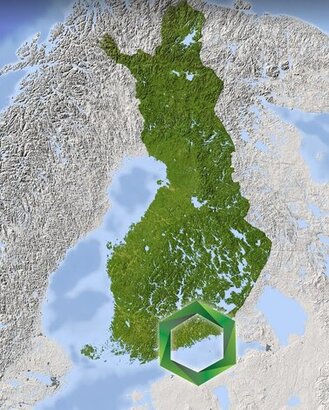
The Sunila site, located in Kotka in southern Finland, is owned by Stora Enso, a global leader in renewable materials and a co-owner of CarbonScape. In 2023 Stora Enso closed its pulp production and lignin extraction operations at Sunila and will now lease part of the site area to CarbonScape.
CarbonScape is currently advancing its engineering study for the demonstration plant, as well as its first commercial plant. The aim is to start construction of the demonstration plant next year and begin sample production in 2026.
The company has developed a low cost and carbon-negative biographite made from wood biomass. This material has been engineered to replace mined or fossil-based synthetic graphite in lithium-ion batteries, addressing critical supply chain and sustainability challenges in the rapidly growing electric vehicle and energy storage sectors.
“Our partnership with Stora Enso and the decision to locate our demonstration plant in Sunila underscore the global potential of our technology” said Ivan Williams, CEO of CarbonScape. “By producing biographite from sustainable wood sources, we're not just creating a new supply chain – we're redefining what's possible in battery technology.”
The selection of Stora Enso's Sunila site comes a year after the forest industry leader became a shareholder in CarbonScape. This collaboration combines CarbonScape's cutting-edge technology with Stora Enso's expertise in bio-based innovations from renewable materials.
“Hosting CarbonScape's demonstration plant at our Sunila site aligns perfectly with our shared vision for advancing sustainable battery technologies and the shift to renewable materials” added Juuso Konttinen, Senior Vice President of Biomaterials Growth Businesses at Stora Enso. “This partnership enables us to explore synergies between our plants, driving innovation and strengthening Stora Enso's leadership in sustainable solutions.”
Since 2018, CarbonScape has been optimising its biographite production process at its pilot plant in New Zealand. The new demonstration plant in Sunila represents a significant scaling up of this technology, paving the way for full commercialisation.
The demonstration plant will have three main purposes:
Produce larger biographite samples for OEMs and battery cell makers and for product qualification purposes
Train operators and engineers in a large industrial setting
Getting closer to one of the end markets for CarbonScape: Europe
With graphite comprising up to 42 percent of the volume of a lithium-ion battery, the development of a sustainable, locally produced alternative is of critical importance. By 2030, over 90 percent of the world's battery-grade graphite will come from China, creating potential supply chain vulnerabilities for the growing electric vehicle and renewable energy storage industries.
CarbonScape aims to offer biographite that offers a price competitive solution delivering performance and environmental superiority, while enhancing energy security – enabling localised production of the material. This aligns with recent policy initiatives such as the European Critical Raw Materials Act and similar measures in North America aimed at securing strategic battery materials.
For additional information:

